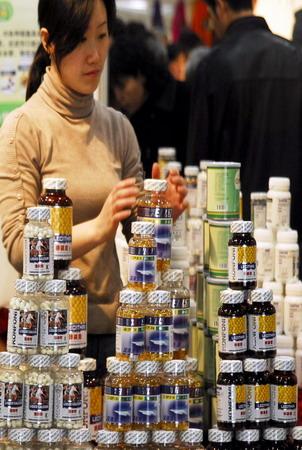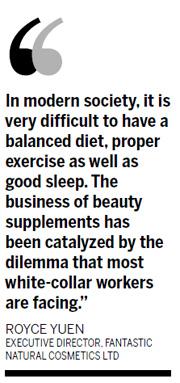
A saleswoman checks her health supplements in a promotion to local customers at a supermarket in Hangzhou, capital of East China's Zhejiang province. [Photo / China Daily]
BEIJING - Toner, serum, moisturizing lotion and eye cream: part of the daily skincare procedure for 27-year-old Zhang Chi. The Beijing entertainment reporter follows this up by swallowing some indeterminate white powder washed down with a sugary drink and then pops a variety of colorful pills.Proud of her smooth, pale skin, Zhang said: "Covering the celebrity beat is a tough and stressful job and on top of that I'm a workaholic and am always working more than 10 hours a day. These beauty and health supplements help me to maintain a healthy and beautiful skin.
"I take multivitamin pills because I don't eat at a regular time and I am also addicted to junk food. Collagen drinks and powders help me avoid skin sensitivity and acnes.

Some devotees of skincare apply high-end creams under strips of gold foil or even lotions made partly with expensive caviar to their faces in their quest for both inner and outer beauty.
Health supplements and nutricosmetics have become an essential part of their lives for Chinese women in a craze for a glowing skin, slimmer waistlines or better sleep that is sweeping across the country.
Serene Wong, chief executive officer (CEO) of TNS Research International China, said the beauty care market in China is booming, having risen from a $44.83 billion compound annual growth rate (CAGR) in 2002 to $66.6 billon CAGR in 2009. It is expected to reach $77.84 billion by 2012.
As for beauty supplements in particular, the market value is estimated at about 2 billion yuan ($303 million) and is expected to exceed 20 billion yuan within the next five to eight years.
Royce Yuen, executive director of Fantastic Natural Cosmetics Ltd, better known as FANCL, a Japanese manufacturer of cosmetics and nutritional supplements, said: "China is the second largest market for FANCL after Japan because awareness of beauty has increased greatly over the past several years."
FANCL entered the Chinese mainland in 2005 and now has a presence in 37 Chinese cities with more than 100 outlets.
As a further sign of exponential growth, Inneov, a manufacturer of beauty pills owned by L'Oreal SA and Nestle SA, recently announced it would enter the Chinese market next year after noticing an increasing number of Chinese people taking dietary supplements to improve the condition of their skin and hair.
Inneov estimates that Asia accounts for about 1 billion euros of nutricosmetic sales, or half the world's total, while Europe and the Americas each generate around 500 million euros.
"In modern society, it is very difficult to have a balanced diet, proper exercise as well as good sleep," Yuen said. "The business of beauty supplements has been catalyzed by the dilemma that most white-collar workers are facing."
Chen Junshi, director of the Fortified Food Office (FFO) under the Chinese Center for Disease Control and Prevention, said: "Half of Chinese residents lack enough iron and one in four is suffering from iron-deficiency anemia.
"For female white-collar workers, the problem seems to be more serious since many of them are always on a diet."
Chen added that taking some supplements, for example calcium or vitamins, was good. "If the products contain certain nutrition to the minimum level of people's daily needs, it won't cause any problems relating to excessive ingestion," he said.
Yuen said: "All FANCL's beauty supplement products are made from natural materials without any chemicals, additives or preservatives." For example, blueberries have been added to products because they help to protect eyes. Potherb is used to make dieting products.
Traditionally Chinese medicine works on the principle that the human body is an organic entity whose external appearance reflects what is going on inside.
Yuen said that the combination of health and beauty will be a trend in the skincare industry and it is also FANCL's philosophy.
Pierfrancesco Morganti, president of the International Society of Cosmetic Dermatology (ISCD), addressed the first Skin Nutrition and Health Care Industry Forum held in Beijing in late May. He said that to use cosmetics and foundational food is normal for consumers in supporting their beauty and wellness, as the body encounters an environment that is every day more hostile to humans.
"Collagen is one of the most popular beauty supplements in China. It is able to help stop wrinkles and create a flawless complexion," Yuen said.
In addition, coenzyme Q10 supplements are popular choices for fighting wrinkles among Chinese consumers.





